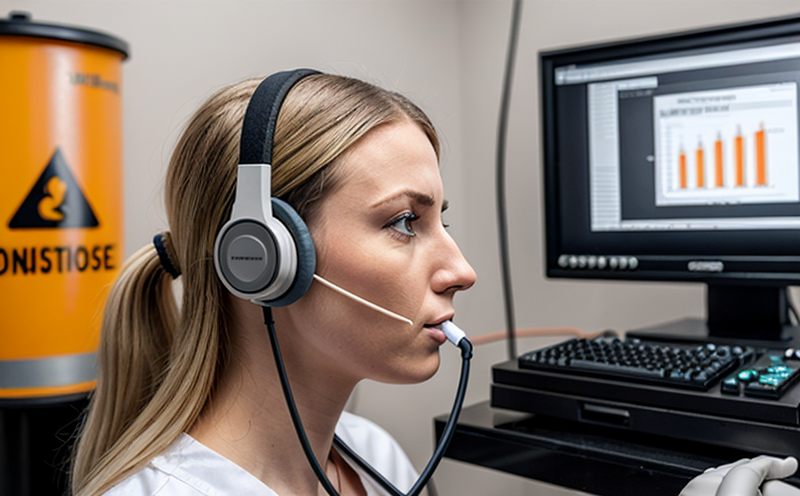ASTM E1050 Acoustic Impedance Measurement for Hearing Devices
The ASTM E1050 standard is pivotal in the field of occupational noise exposure and hearing protection testing, focusing specifically on the acoustic impedance measurement of hearing devices. This service is essential for ensuring that hearing aids and other auditory protectors are functioning correctly under various sound environments and meet stringent safety standards.
Acoustic impedance measurements play a critical role in understanding how sound waves interact with an ear canal and eardrum, which is fundamental to assessing the effectiveness of hearing protection devices. This standard provides detailed procedures for measuring acoustic impedances at multiple frequencies using impedance tubes or similar setups. The results help manufacturers ensure that their products are safe and effective in reducing noise-induced hearing loss.
For compliance officers and quality managers, this service ensures that occupational health standards are met by providing accurate measurements of how well a device can attenuate harmful noise levels. This is particularly important for industries like manufacturing, construction, and mining where workers are exposed to high decibel environments on a daily basis.
The ASTM E1050 process involves several key steps: first, the hearing device under test (HDT) is placed in an impedance tube. The tube measures the acoustic properties of sound waves as they travel through it. This setup allows for precise measurements at different frequencies, which are then analyzed to determine the HDT’s performance.
The standard specifies detailed requirements for the equipment used and the procedures followed during testing. Compliance with ASTM E1050 ensures that hearing protection devices provide a consistent level of attenuation across various sound environments. This consistency is crucial for maintaining worker safety and reducing long-term health risks associated with noise exposure.
Real-world applications of ASTM E1050 include ensuring that hearing protectors like earplugs, earmuffs, or custom-molded devices meet the specified standards for noise reduction rating (NRR). By accurately measuring acoustic impedances, this service helps in validating that these devices can effectively block harmful noise frequencies. This is especially critical for industries where workers are exposed to prolonged periods of loud sounds.
The ASTM E1050 standard also aids in R&D efforts by providing a reliable method for evaluating new prototypes and materials used in hearing protection devices. This ensures that innovations not only improve comfort but also enhance the overall performance and effectiveness of these critical safety tools.
In summary, the ASTM E1050 service is an indispensable tool for ensuring compliance with occupational noise exposure regulations while promoting safer work environments. By accurately measuring acoustic impedances, this standard helps protect workers from the detrimental effects of excessive noise levels, thereby contributing to a healthier and more productive workforce.
Quality and Reliability Assurance
- Consistency: Ensures that all measurements are performed under controlled conditions, leading to consistent results across different devices.
- Precision: The equipment used in ASTM E1050 testing is highly precise, providing accurate data for each measurement.
- Repeatability: Multiple tests can be conducted with the same setup to verify that the results are consistent and reliable.
The reliability of these measurements directly impacts the effectiveness of hearing protection devices. By maintaining strict adherence to ASTM E1050, laboratories ensure that their testing processes are robust and dependable, leading to greater trust in the accuracy and safety of the test results.
Quality assurance is a continuous process that involves regular calibration of equipment, training of personnel, and thorough documentation of all tests performed. This ensures that every measurement adheres to the highest standards set by ASTM E1050, thereby enhancing the overall reliability of the testing service provided.
International Acceptance and Recognition
The ASTM E1050 standard is widely recognized globally for its stringent requirements in acoustic impedance measurement. This ensures that the results obtained from this service are universally accepted, providing a consistent benchmark across different regions and industries.
Many countries have incorporated ASTM standards into their national regulations, making compliance with ASTM E1050 not only beneficial but often mandatory for manufacturers and employers operating within these jurisdictions. The international acceptance of this standard is crucial for companies looking to expand their markets or ensure that their products meet global safety standards.
The use of ASTM E1050 in occupational noise exposure testing ensures a high level of reliability and consistency, which are essential for maintaining worker safety across different cultures and regulatory environments. This widespread recognition underscores the importance of adhering to this standard when conducting acoustic impedance measurements for hearing devices.
Competitive Advantage and Market Impact
The use of ASTM E1050 in occupational noise exposure testing provides significant competitive advantages for companies that implement it. By ensuring compliance with a globally recognized standard, these firms can demonstrate their commitment to worker safety and regulatory adherence. This not only enhances brand reputation but also fosters customer trust.
Adhering to ASTM standards can lead to improved product quality and enhanced market credibility. Companies that invest in rigorous testing processes like those outlined in ASTM E1050 are better positioned to meet the stringent requirements of international markets, thereby expanding their global reach.
In addition to regulatory compliance, the use of this standard helps companies stay ahead of emerging trends and technological advancements in hearing protection devices. By continuously meeting or exceeding these standards, firms can differentiate themselves in a crowded market, attracting customers who prioritize safety and innovation.
The competitive advantage gained through adherence to ASTM E1050 extends beyond immediate sales increases. It also contributes to long-term sustainability by fostering a culture of continuous improvement and excellence within the organization. This focus on quality not only benefits current operations but also paves the way for future growth and success in the industry.





